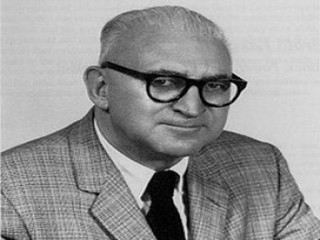
Harold Lasswell biography
Date of birth : 1902-02-13
Date of death : 1978-12-18
Birthplace : Donnellson, Illinois
Nationality : American
Category : Science and Technology
Last modified : 2011-06-06
Credited as : Political scientist, theories of the natural sciences,
The American political scientist Harold D. Lasswell is known chiefly for his studies of political terminology, his application of psychology to politics, and his attempt to construct a system of politics modeled on theories of the natural sciences. He was also president of the American Political Science Association.
Harold Dwight Lasswell was born in Donnellson, Illinois, the son of a Presbyterian clergyman and a schoolteacher, on February 13, 1902. He attended the University of Chicago at 16 and graduated in 1922. He received his doctorate from the same institution in 1926; his dissertation, Propaganda Technique in the World War (1927) is recognized as a leading study on communication theory. At Chicago he studied under Charles Merriam, who first propounded the behavioral understanding to politics. He also studied at the universities of London, Geneva, Paris, and Berlin. At Berlin he studied Sigmund Freud, which cemented his psychological approach to political science.
The University of Chicago made Lasswell an assistant professor in 1927 and an associate professor in 1932. He remained at Chicago until 1938, when he transferred to the Washington (D.C.) School of Psychiatry for a year. During World War Two he served as the director of war communications research at the Library of Congress and taught at the New School of Social Research in New York City and Yale Law School. In 1946 he began lecturing at Yale, where the university named him Edward J. Phelps Professor of Law and Political Science.
Lasswell made his early reputation as a behaviorally oriented theorist with his psychoanalytic study Psychopathology and Politics. Utilizing Freudian psychology for the study of politics, he believed that the psychoanalysis of political leaders would reveal significant knowledge about politics. For example, knowledge about the childhood sexual experiences of political leaders would reveal why some were radicals and others conservatives, why some were revolutionaries and others establishment administrators.
Knowledge of this nature, Lasswell believed, would have important implications for future politics. As the use of psychoanalysis became more widespread, the social psychiatrist would replace the social philosopher, and the politics of the future would be more preventive in nature than curative, with problems being solved less by discussion and more by psychoanalytical therapy. He saw his approach as a radical redefinition of the problem of politics and termed it the "idea of preventive politics." Our problem, he wrote, is to be ruled by the "truth" about the conditions of harmonious human relations, which truth was to be yielded by Freudian psychoanalytic methods.
Lasswell's thesis and political program in this work have been heatedly criticized. The chief objection is his assumption that Freudian psychology represents a kind of intellectual "philosopher's stone" providing him with infallible truth. So too, the politics of the future apparently would be run by Lasswell and social scientists like him who possessed this knowledge, a kind of modern day class of Platonic philosopher-kings.
Perhaps Lasswell's most highly regarded work is World Politics and Personal Insecurity (1935). Richard Merelman in British Journal of Political Science, asserted that it, "contains some of Lasswell's most interesting ideas about the tie between state symbolism and the individual psyche." Another widely read work is Politics: Who Gets What, When, How (1936), a work in the elitist strain (the theory that no matter what the formal structure of government, a minority always will have real power) in which he stressed as motive forces in politics the drives of income, safety, and deference. The work also showed his preoccupation with defining political terms. From 1937 to 1950 political science journals did not publish Lasswell's work, but his writing found a home in psychiatric journals. However, Lasswell's work found new supporters in younger academics, and in 1955 he was elected president of the American Political Science Association.
Power and Society: A Framework for Political Inquiry (1950), which Lasswell coauthored with Abraham Kaplan, was also in this vein. It is a series of definitions and propositions linked together in such a way that an almost self-contained language results. It has been criticized on the ground that even in the natural sciences language is determined by usage, not by arbitrary definition or individual pronouncement, and the result has been confusion, not clarification. It has also been criticized on the ground that the purported positivistic, or empirical, approach actually incorporates Lasswell's own system of hidden values. The work, however, has been considered as a stimulation to further research in system building or constructing a new theory of politics.
Later scholarship pointed to Lasswell's treatment of political symbols as a significant contribution which only subsequently came into general use. He analyzed the effect of the political symbol (such as "law and order," "feudal," and "progressive") as being laden with positive or negative connotations and calculaed to evoke certain emotional responses among the populace.
After leaving Yale in 1970, Lasswell served as a Distinguished Professor at the City University of New York until 1972. He was then named Distinguished Professor at the Temple University School of Law, where he remained until 1976. Columbia University also named him Albert Schweitzer Professor of International Affairs. In 1976 Lasswell retired from teaching and gave his time to the Policy Sciences Center and his writing. Lasswell died on December 18, 1978.
















